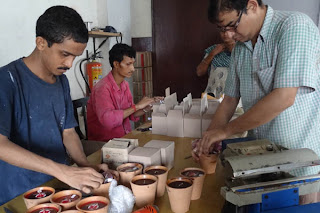He says, "It all began in 1975 when I was working at Geological Survey of India located beside the Indian Museum near Chowringhee. My nephew, a verbally challenged boy, had been studying in Government Art College, close to my office. He'd often drop in to meet me at the office along with a friend called Amal Bera, another mute artist of the college." Bera had formed an interesting group with other mute artists at his college. The strange group of talented young artists used to craft beautiful greetings cards as well as other artefacts. One day Ray happened to see those and was quite impressed by their artistry.
 |
| silence made candles |
An enthused Bera requested Samir Ray to help them sell the artefacts. Then Ray requested one of his friends, Sujay Sreemal, a successful businessman to take over the project. "They were excellent artists but they'd no sense of marketing", reminisced Ray. As soon as Sreemal lent his marketing acumen multinational companies like ITC and Union Carbide started buying the artefacts in bulk. Since the companies had a policy not pay the artists individually they were asked to form an entity or organisation. They named themselves 'Silence' and were able to open a commercial bank account. Thus 'Silence' was born on April 11, 1979.
In 1981, Samir Ray left the job at Geological Survey and joined 'Silence' as a full-time worker. "In those days I was paid a monthly salary of Rs500," said Ray. Now Silence has its handicraft shop at the porch of Dakshinapan market in southern Kolkata. They showcase their products such as greeting cards, scented candles. Now, after three decades the organisation earns nearly Rs 2 crore per year. "After keeping aside 10 per cent of the income for administrative purpose, we distribute the rest among the members of our organization", said Sharmila Bhattacharya. "Silence, is perhaps the only NGO in Kolkata, whose actual mission is to include the deaf-mute in the mainstream of the society; we don't want them to live out of charity". Today, various products made by these people, are exported all over the world. Now they also make furniture, jewellery and other mementos which are sold at a premium price. "Since packaging and designing is an important aspect of marketing, we have opened a separate packaging division", added Bhattyacharya.
The sound of a ringing bell broke our discussion in the conference room. It was lunchtime at the Silence workshop. We could hear footsteps moving towards the cafetaria at the top floor. "It's lunch hour; we provide our students and workers a free meal", said Subroto Majumder. At the top floor, workers of started queuing in front of the food stall. The simple food, consisting of rice, dal (lentil soup) and vegetable curry were collected by the workers on their plates. The simple and fresh food was relished by these workers.
 |
| workers of Silence |
"Unknowingly, what many people buy from various gift shops in Kolkata at a steep price is manufactured by these silent workers", added Chanchal Sengupta, coordinator of 'Silence' at the lunch table. "First we train them to perform various works like making candles, graphic designing, carpentry or jewellery making. After that we employ them in the production unit," he says. According to him, as their world of the deaf mute is devoid of sound, the ability to concentrate is better than 'normal' people. "They are good at doing repetitive work, and actually are more skilful than able-bodied workers", said Samir Ray. This is why what they produce through hard work is usually flawless. That Ray was not exaggerating became evident when we visited the 'product exhibition' room. The white, dull walls were reflecting bright vibrant colours of various beautiful creations. Candles, cards, Christmas trees, jewellery and other showpieces created the ambience of Christmas.
'Silence' exports these good all over the world. International buyers are very strict about quality, and even a tiny error can lead to the cancellation of a whole shipment. Hence we have to be doubly cautious while working on the export-quality goods", said Sengupta. No one ever expected that these people can work and sustain themselves. They were treated like burden in the society. But Silence has turned these 80 people from burden to assets of the society. |
No comments:
Post a Comment